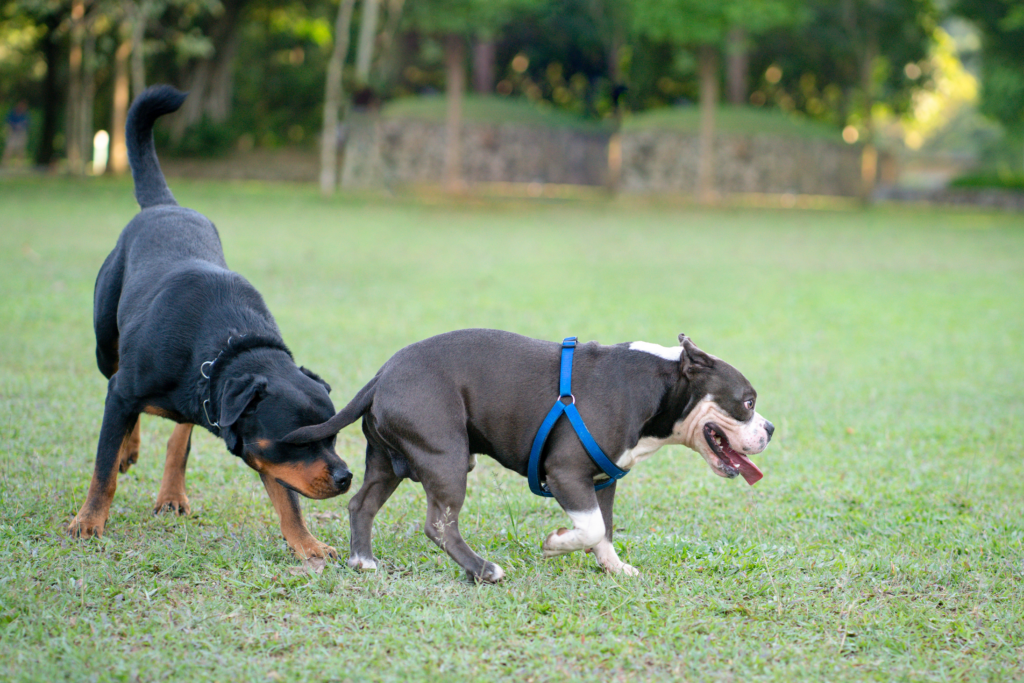If you’ve found yourself wondering, “Why do dogs sniff butts?” You’re certainly not alone!
It may feel awkward to watch your dog investigate the butt of every dog they come across, but it’s simply their way of saying “Hello!” It’s actually thought that dogs can learn more about each other simply by sniffing each other’s butts than humans can after hours of conversation.
But how is this possible? The answer lies in understanding dogs’ incredible sense of smell.
A dog’s sense of smell
Dogs use 40 times more of their brain for processing scents than humans do. In fact, dogs have 300 million olfactory receptors (aka smell receptors) in their olfactory system unlike humans who only have five million.
When dogs inhale through their nostrils, scent particles or molecules transmit to the dog’s brain for processing. Some even believe that dogs can measure the passage of time through their noses. One study suggests that dogs know when it’s time for their parents to come home from the smells or movement of odors in the house. The longer their pet parent is gone, the less of their scent is present, meaning it must be time for them to return home.
Dogs have another chamber in their nasal cavity to decipher scent codes called the vomeronasal organ, or Jacobson Organ. This is a special organ on the roof of the mouth that detects pheromones that influence social behavior. You can watch a dog sniffing and see Jacobson’s organ in use by their slack jaw and mouth breathing. Cats can also do this; they open their mouths wider and usually look disgusted when using their Jacobson organ. That silly-looking expression is called the Flehmen Response.

So, why do dogs sniff each other’s butts?
You may feel uncomfortable when your dog checks out a new dog’s rear end, but just know that it’s a natural dog behavior. They’re just trying to get to know their new friend!
Many dogs are actually less likely to become aggressive if allowed a good sniff or two. However, on the other hand, some dogs can be overly diligent when checking out a new friend, so watch their body language closely. That new friend may need more personal space than your dog is honoring.
Training your dog to sit and stay can help when socializing, just in case a good sniff greeting is unwelcome. Controlling your dog’s exploratory behavior, if needed, can help you avoid any conflicts.
Why butt sniffing?
It’s normal to wonder “Why does my dog sniff butts and not the belly or ears?” When dogs meet, their butts provide vital information that determines whether that new dog is a friend or a foe. A dog’s butt contains two anal glands or anal sacs. They contain potent chemical secretions of pheromones and scent molecules that provide information about your dog to other dogs.
Did you know: Groomers or vets will occasionally express a dog’s anal glands to avoid blockages or infections.
While we think there’s a significant poop odor back there, our dogs completely ignore that and hone into only the anal secretions.
A few well-placed sniffs can communicate:
- Gender
- Reproductive status
- Health status
- Diet
- Emotional state
One of the more notable dog facts is that male dogs do more butt sniffing in public areas than female dogs. And dogs remember scents – so they will quickly recognize humans or dogs they have previously met. Think of it as a biography written in scent molecules and pheromones! This is a prime example of chemical communication that’s seen throughout the animal kingdom.
Pet Pro Tip: Illnesses won’t wait to happen. It’s never too early to enroll in pet insurance. From common parasite infections, to costly hereditary illnesses, pet insurance can be worth it and can cover crucial eligible treatment your pet may need for their unexpected accidents and illnesses. Find out how pet insurance works, what pet insurance covers, and choose a plan today.
What if my dog isn’t interested in sniffing other dogs’ butts?
If your dog doesn’t seem interested in sniffing dog derrieres, there can be a few reasons:
- Some dogs prefer people to dogs and aren’t interested in socializing
- Some dogs may have a diminished sense of smell due to age or illness
- Some dogs have had previous trauma that invokes fear or anxiety
Talking to your veterinarian about your dog’s behavior can help narrow down the possibilities and ensure everything is okay with your tail-wagger’s health. And remember, if your dog’s not a butt sniffer, it doesn’t necessarily mean anything’s wrong with them.
The final word on dog butt sniffing
Next time you feel awkward while your dog grabs a quick sniff of another dog’s behind, remember that butt sniffing is not a common dog behavior problem you should worry about. Think of it like a doggy handshake – it’s how they progress from “who are you?” to “let’s play!”




